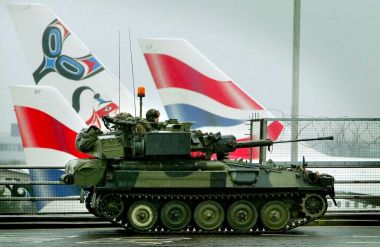British police could axe teams guarding against missile attacks on jets

Specialist British police teams that guard against attacks on planes by militants armed with surface-to-air missiles areat risk of being disbanded because of cost-saving measures, according to sources close to the units.
Global aviation experts have warned that a proliferation of shoulder-launched missiles, known as Manpads (Man Portable Air Defence Systems), poses a serious threat to passenger planes, and the US Department of State has said countering the spread of the weapons is a top national security priority.
Known as Flight Path Protection Teams (FPPT), the British police units were set up in 2008 to find and negate the threat from locations near airports where militants could fire Manpads or similar weaponry at planes as they take off and land.
They also work with local communities to collect intelligence about any suspicious activity.
Police chiefs plan to reduce their number from about 50 officers around the country to two constables based in London because they have assessed that there is currently minimal risk of such attacks, the two sources told Reuters.
Home Office, the government department responsible for police and counter-terrorism, said it could not comment on an operational matter. The police declined to confirm or deny whether the units were being cut, saying they could not comment on strategic counter-terrorism issues.
The British government, which joined US-led air strikes against Islamic State in Syria on Thursday, upped spending on counter-terrorism last month in the wake of the Paris attacks, and spared police from the spending reductions that will hit other areas as part of an austerity drive.
But the possible axing of most FPPT officers highlights the strategic decisions facing police chiefs, whose overall budgets remain under pressure after deep cuts over the last five years. They have been looking at how to make savings by combining staff and operations where possible.
Threat level
Britain is on its second-highest threat level, meaning a militant attack is considered highly likely. Prime Minister David Cameron said last month seven potential attacks had been foiled in the past year and Security Minister John Hayes told a conference in London on Wednesday that aviation remained a target for militants.
The sources, who spoke on condition of anonymity as they are not authorised to speak publicly, said the FPPT plans made no sense, coming in the wake of recent attacks on airliners, with the downing of Flight MH17 over eastern Ukraine in July that killed all 298 people on board and the bombing of a Russian plane in Egypt in October that killed 224.
"Because there's no intelligence at the moment suggesting this is imminent they have said we can take this risk, get rid of the units and save £3 million a year," a source with close knowledge of the situation told Reuters.
"The way the world is at the moment with the stuff in Egypt, the stuff in Paris, it seems ridiculous."
The Ukraine and Egypt attacks are not thought to have been carried out with shoulder-launched missiles.
The National Police Chiefs' Council said a comprehensive review of how to use counter-terrorism policing resources had been underway for two years.
"This will ensure that we have the right resources in the right places," a spokesman added. "It helps us understand the services delivered across the network and, combined with a clearer picture of where the threats lie, decisions can be taken on prioritising and transferring assets around the country."
According to the sources, the proposal for the FPPT would see the task taken on by two London-based officers who would respond to any intelligence of a potential threat by leading a reaction force to quickly map relevant flight paths, which could involve a "footprint" of more than 1000 sq km (386 sq miles).
"To think that a team can come in and map a whole area within such a short space of time, it's just ridiculous really. The whole things is just flawed, the whole concept is just nonsense," said the second source, a former FPPT officer who recently retired.
Vulnerabilities
A UN panel of experts said last year that thousands of Manpads from Libya were in the hands of "non-state actors" following the ousting of Muammar Gaddafi. It said Manpads had been moved to countries like Mali and Tunisia and "were clearly part of terrorist groups' arsenals".
While the British security services say there has never been evidence that there are any Manpads in the UK, the former officer said such weapons were available on sale on the black market abroad for less than £5,000.
Soldiers and tanks were deployed at Heathrow Airport in 2003 over what a police source at the time described as a threatened al Qaeda rocket attack, although it was not specified what the threat or the intelligence was.
In 1994, the IRA targeted Heathrow airport with mortar bombs, but the attack caused no injuries and little damage after the mortars failed to explode.
"The shooting down of MH17 over Ukraine demonstrated the importance of understanding the vulnerabilities of air routes and securing air space," Kashif Chaudry, the head of international strategy for aviation security at Britain's Department for Transport, told the London security conference.
"The wide proliferation of Manpads, portable air defence systems, again highlights the new methodology of attack that we need to be conscious of, and we need to see how we can respond to it."











